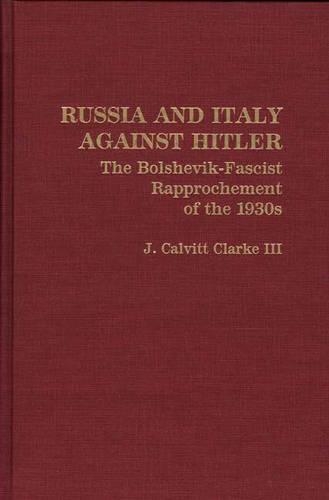
Russia and Italy Against Hitler: The Bolshevik-Fascist Rapprochement of the 1930s
(Hardback)
Publishing Details
Russia and Italy Against Hitler: The Bolshevik-Fascist Rapprochement of the 1930s
By (Author) J. Calvit Clarke
Bloomsbury Publishing PLC
Praeger Publishers Inc
28th February 1991
United States
Classifications
Tertiary Education
Non Fiction
327.45047
Physical Properties
Hardback
240
Width 156mm, Height 235mm
595g
Description
"Russia and Italy Against Hitler" uncovers the complex web of ideology, economics, military co-operation, and diplomacy binding Italy and the USSR together prior to 1935. This previously untouched part of pre-World War 2 historiography makes sense of the seemingly contradictory co-operation between Stalin and Mussolini. The bulk of Clarke's research comes from the Italian Foreign Ministry Archives and covers the period from 1924 to 1941, a perspective that sheds new light on Stalin's Russia and Mussolini's Italy. This volume deals comprehensively with Italo-Soviet relations and their diplomatic roles in interwar world politics. Part 1 provides the background leading to their serious co-operation in 1933 and 1934: tripartite Italo-Soviet-German co-operation against France (1929 and 1930); Italian/Soviet responses to Hitler's rise; and the impact of Mussolini's Four Power Pact (1933). Part 2 covers Moscow's attempt to break out of its isolation and describes ideological, economic, and political rapprochements, as well as the Pact of Friendship, Neutrality, and Nonaggression (1933). Clarke then covers military contacts and looks beyond bilateral Italo-Soviet relations to collective security. His epilogue explains why Italy joined with Germany two years later against the Soviet Union.
Author Bio
J. CALVITT CLARKE, III, is an Assistant Professor of History at Jacksonville University where he specializes in Soviet history, as well as modern European and diplomatic history. He is presently working on a follow up to Russia and Italy Against Hitler which will cover Soviet-Italian relations from 1935 to 1941.
